Edinburgh experience
From artists to zoologists, many graduates view their time at Edinburgh as the formative years of their professional lives.

Here we share a few of your experiences and updates. On the Alumni website, we publish five alumni profiles each month, where you can read short autobiographies of your fellow Edinburgh graduates dating back more than 70 years. You can also submit your own profile – we love to hear where your Edinburgh experience has taken you.
Hermione Cockburn
BSc Geography 1993, PhD Geomorphology 1998
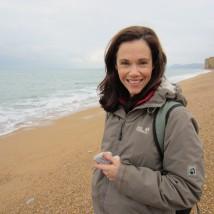
The prospect of going to a Scottish university 450 miles from Brighton, where I went to school, seemed both exotic and alluring.
More by luck than judgement, I found myself in a city with an incredible landscape and in a department that excelled in geomorphology – both influenced my passion for landscapes and geoscience.
I thoroughly enjoyed departmental trips to the Cairngorms, Snowdonia and Iceland. In addition, I’d go off to youth hostels around Scotland with a friend who had a car (very unusual in those days!) and developed a love of walking and the Scottish landscape.
When I finished my PhD, I heard rumours about a new visitor attraction and science centre being built near Holyrood Park called Our Dynamic Earth. I was determined to work there and got a job developing their original education service. Dynamic Earth gave me an insight into science communication and that’s what I’ve focused on ever since.
In 2002, I won a BBC talent competition called Science on Screen. Since then I’ve presented various science and history shows for the BBC including ‘What the Ancients Did For Us’, ‘Rough Science’, ‘Midsummer Live’ and ‘Coast’. I wrote a book ‘Fossil Detectives: Discovering Prehistoric Britain’ to accompany the BBC2 palaeontology series I presented, for which I interviewed my hero Sir David Attenborough about his life-long love of fossils.
I’ve also presented Radio 4 programmes on subjects ranging from lead pollution and lasers to reservoirs and greenhouses, and an award winning series on bacteria. For the past 10 years I’ve taught environmental science for the Open University in Scotland.
You could say my career has come full circle in that I’ve just started as the new Scientific Director at Our Dynamic Earth. It is wonderful to be back, taking over from Professor Stuart Monro who I worked with at the start and who has been an inspirational figure throughout my career.
John Fortune Lloyd
MA English Literature 1967
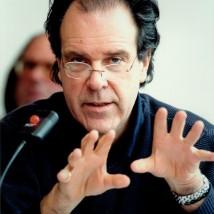
I had recently turned 17 when I came to university. It was too young and like many who were the first from their family to go to university, I had too little background and had done too little preparation. To take university seriously, you need to think more carefully than I did about how to approach and benefit from it.
I wanted to be a writer and settled on journalism, which became my trade for much of my life. That meant that I spent long hours at the Student newspaper, first as an assistant, then as editor. My studies suffered, of course. I made up some way in the third and fourth years and got a 2:1, but I read too little, thought too little.
I worked in every holiday: as a farm worker, a waiter, a relief refuse collector. I was lucky to get a small flat, in a tenement off the Pleasance, which were being cleared and rented to students while waiting for development to start: the rent was £1.10s a week — a godsend for a slim budget.
I wrote a play for the DramSoc and had a story read on BBC Radio 4. I wanted to write the great Scottish novel; came to London, took a job as a nightwatchman in a warehouse, tried to write it, but didn’t.
I slid into journalism through the “alternative” press — Ink, Time Out, then a short spell on the Evening Standard, a longer stretch on the new all-news radio station LBC, two years on a TV current affairs programme Weekend World, then the Financial Times.
In between I edited the New Statesman. In the last eight years, I co-founded the Reuters Institute for the Study of Journalism at the University of Oxford, which has become a success. I’ve had a full life in journalism, and still live in it: I do a column for the Rome daily La Repubblica and another for Reuters, as well as writing still for the FT.
Christine De Luca
MA Geography 1969, MEd 1980
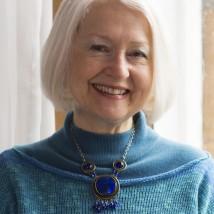
My parents both had a fondness for Edinburgh, where they had studied. That whetted my appetite and it seemed far enough away from home (Shetland) to be a little adventurous.
I enjoyed the physicality of the experience as much as the content – dashing between Geography in the historic lecture halls at High School Yards, English Literature in a former church, Psychology in the Pleasance theatre, Mathematics in Adam House, Logic and Metaphysics in the new David Hume Tower; to cramped tutorials in old tenements with the lecturer’s dog under the desk.
Near the end of term, when money was running short, we could buy egg and beans on toast for 1/4d — equivalent to 6p — in Wilkie House in Guthrie Street.
I had always wanted to teach, so my undergraduate degree was a great basis for teaching geography. It was a time of rapid development in education: the raising of the school leaving age to 16, the introduction of comprehensive education and mixed-ability teaching in secondary classes. I got involved with research into styles of teaching and learning and that led to my MEd, focusing on educational research.
I worked on a research project in the Education Department for three years, exploring assessment techniques suitable for the whole ability range. After that I moved to the Scottish Examination Board (later the SQA) and remained there until I retired.
For many years I spent any spare time I had reading and writing poetry (in English and in Shetlandic, my mother tongue). It has always been a love of my life. It was therefore natural that, when I retired, I devoted more time to this.
I have published a dozen books over the years, mostly poetry but also children’s stories and a novel, and have won a few prizes. Recently my collection ‘Dat Trickster Sun’ (Mariscat Press, 2014) was shortlisted for the Michael Marks Poetry Pamphlet Prize.
I recently became Edinburgh’s Makar (poet laureate).
Adrian Searle
MA History and History of Art 1989
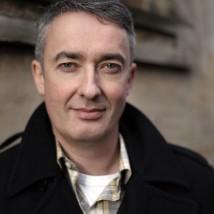
I could talk all day about my four years at Edinburgh. I loved every minute. To study at one of the world’s best universities in a beautiful capital city was very inspiring.
I worked as a porter in Edinburgh’s best hotels every summer, starting with the North British (now the Balmoral). I also had great Saturday jobs — including walking a very stupid but lovely dog called Seamus and selling posh tiles to rich Edinburghers.
The secondhand bookshop scene was great – I bought far too many books, many of which I still have. My love of books has come full circle as I now run one of Scotland’s leading publishers, Freight Books, and I’m a published author.
Having published ‘Look Up Glasgow’, a photography book about the amazing sculptures at the tops of buildings in Scotland’s biggest city, with photographer David Barbour, I recently followed up with ‘Look Up Edinburgh’, and ‘Look Up London’.
I won two awards for the humour book ‘101 Uses of a Dead Kindle’, and have been nominated for an award for ‘If Dogs Could Swear’, both authored with artist and illustrator Judith Hastie.
Freight Books was founded in 2012 and has been runner-up Scottish Publisher of the Year for the last two years. I also co-founded the design and marketing consultancy Freight Design.
My degree and time in Edinburgh has had a big influence on my career. My intellectual training has been invaluable, as have the communication skills developed during the four years spent at the University.
I developed a strong interest in Scottish art and literature, two things that continue to give me great pleasure today.
Susan Cheyne
BSc Zoology 1998
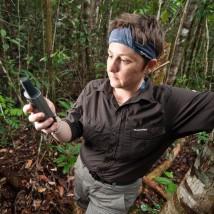
I came to Edinburgh in 1994. I was certain this was the place for me: not only did the University seem perfect but there was something about the city, which just said “home”.
Studying had to be fitted around exploring Edinburgh, both day and night, a full hockey schedule and the fact that I always managed to live at least 30 minutes’ walk from King’s Buildings.
Summer holidays were always the time to try to “achieve” something and the one that really helped shape my career was in 1997 when I went to Thailand to volunteer at the Gibbon Rehabilitation Project near Phuket.
I became a near victim of a falling coconut in Thailand, though fortunately it glanced off my shoulder — no more or less hazardous than field trips up Salisbury Crags or out to the beaches of the east coast of Scotland.
I went to Indonesia in 2002 and am still working there, now co-director of the Orangutan Tropical Peatland Project, lecturer in Primate Conservation at Oxford Brookes University and full-time conservation biologist.
I have established the first long-term gibbon research and conservation project in Indonesia and the first long-term camera-trapping project in Indonesia. In 2011 I co-founded a project leading expeditions to the highlands of Indonesian Borneo to work towards both social and conservation solutions for the forest.
Without my experiences in Edinburgh, access to summer placements and the support of the staff I would not be where I am now — thank you!

